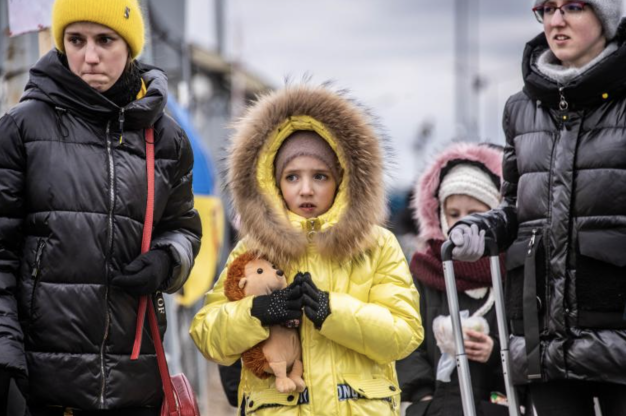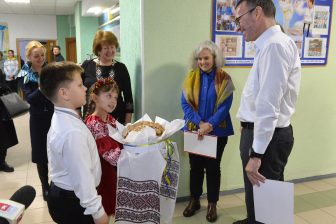
Cash help scheme reaches 350,000 Ukranian children and their families
Over 350,000 children in war-ravaged Ukraine have now benefited from a humanitarian cash assistance programme provided by children’s charity UNICEF.
‘Spilno’, launched in March as a partnership with the Ministry of Social Policy, aims to address the needs of families with children, who are among the country’s most vulnerable groups. Already UNICEF given out around USD $125 million to some 350,000 children, including 35,000 with disabilities, living in 120,000 households.
Families are able to register to receive help, and if approved they receive a swift response through an online platform, with successful applicants receiving an unconditional grant. Priority is given to families with three or more children, and those raising at least one child with a disability.
This target beneficiary group was identified on the basis of a child poverty report for 2020, which shows that nearly half of families in Ukraine were living in poverty. Of these, about 81 per cent of households with three or more children lived below the national poverty line.
‘Accountability to affected populations’
Murat Sahin, UNICEF’s representative in Ukraine, said: “This programme is about helping families in a crisis do what they believe is best for children – no one is in a better position to decide how to get the most out of this support than a parent or guardian.”
One of the key principles of Spilno is accountability to affected populations, and a dedicated telephone hotline has been set up to created to help those having difficulties in applying online. This, says the charity, has been instrumental in supporting the application process and consulting vulnerable families about cash grants.
The programme is also designed to support the Ukranian government’s national social protection system, and so UNICEF is working closely with the Ministry of Social Policy, the Ministry of Digital Transformation and other humanitarian actors to cement links between humanitarian cash transfers and government social protection schemes.
Oksana Zholonvych, Minister of Social Policy, said: “The UNICEF cash program has become an effective tool for supporting families with children in this extremely challenging time and for supporting the entire country. The consolidation of the efforts of the international aid program and the Ministry of Social Policy proves that only together can we effectively overcome challenges and ensure the well-being of children and families.
‘We have enough to eat and buy medication’
“In this cooperation, the state helped to digitize, administer the process, verify the data, so that assistance can benefit those who need it most. We are sincerely grateful to UNICEF for this financial support for Ukrainian families with children and willingness to work in synergy. We count on the further expansion of cooperation in order to address the challenges of war faced by children and families.”
UNICEF has highlighted the case of Vira, her husband and their three children, who because of the had to flee their home in eastern Ukraine and seek refuge in a ‘container’ town for displaced families in the western city of Lviv. “We were so desperate we sold our rings just to buy some food,” said Vira. “With the money we received through the Spilno cash assistance programme, we have enough to eat and buy medication.”
Funding for Spilno has also come from the governments of Italy and Spain, as well as the Swedish International Development Agency, the United Nations Central Emergency Response Fund (CERF), and the European Union, plus many businesses and individuals.
Click here for more information from UNICEF about Spilno.




